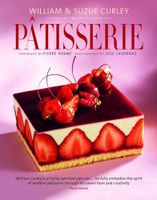Advertisement
By William Curley and Suzue Curley
Published 2014
Structure builders Coagulated egg proteins in both egg whites and egg yolks are important structure builders in baked goods. Eggs are as important as flour in the structure of cakes, in fact without eggs most cakes will collapse. Coagulated (cooked) egg proteins provide thickening and gelling forming structure in pastry cream, crème anglaise and many others. Whole eggs coagulate at around 70°C (158°F), although diluted with other ingredients, the temperature rises to 82-84°C (180-183°F). Egg yolks coagulate at 65-70°C (149-158°F) and egg whites 60-65°C (140-149°F), although again, if diluted with other ingredients the temperature of coagulation will rise. As eggs are heated the proteins gradually denature or unfold and these unfolded proteins move through the liquid and bond with each other. Properly bonded egg proteins form a strong yet often flexible network that traps water and other liquids. We need to be careful though as when the proteins are heated the tighter and more rigid the structure becomes, until they become over coagulated, shrinking and squeezing out liquids, which we call curdling. Being vigilant when cooking eggs is especially important when making something like crème anglaise.



